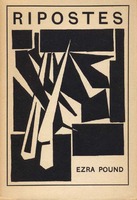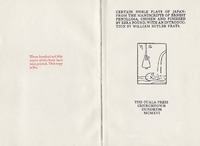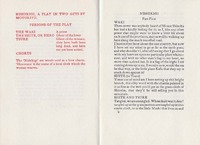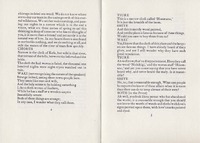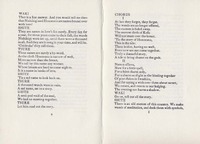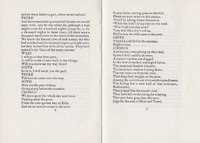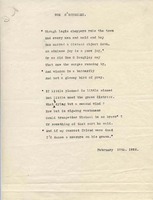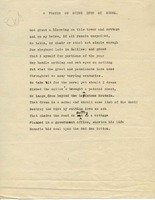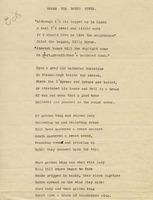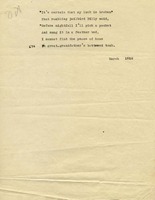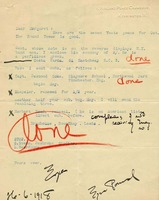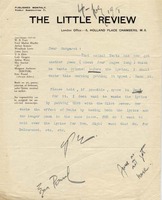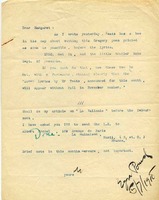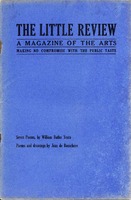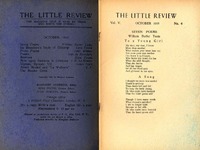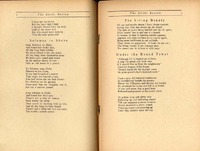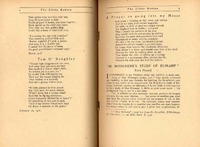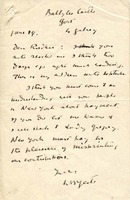Ezra Pound
Ezra Pound, 1885 -1972
Ripostes of Ezra Pound
London: Stephen Swift, 1912
(RARE) PS 3531 .O32 R5
Ezra Pound met William Butler Yeats after arriving in London in 1908. Yeats scholar B. L. Reid wrote of Yeats and Pound:
The Yeats-Pound coalition seemed odd, but it was warm and important to both men. Yeats was by now an eminent and elegant person, but Olympian only when he saw a need, not ordinarily humorless or hard to approach. He described Pound as “a headlong rugged nature,” and he was charmed, amused, and instructed by the energetic, untidy, and irreverent young American (Pound called Robert Bridges “Rabbit Bridges”).
He also respected Pound’s mind, seething with wide half-learning -- classical, Oriental, medieval, Continental, “modern.” Pound was the most generously helpful man of his time to other artists; to Yeats he was an unlikely but necessary angel, an astringent influence pulling him down to earth, urging clarity and directness in imagery and language, opening doors to broader, stranger cultures but wishing them controlled within a frame of history and common sense.
Pound published one of his earlier works, Ripostes of Ezra Pound shortly after meeting Yeats in London.
Ernest Francisco Fenollosa, 1853-1908
Certain Noble Plays of Japan: From the Manuscripts of Ernest Fenollosa, Chosen and Finished by Ezra Pound, with an Introduction by William Butler Yeats
Churchtown, Ireland: Cuala Press, 1916;
reprint, Shannon: T.M. MacGlinchey for the Irish University Press, 1971.
(SPL) PL 887 .F4 1971
In autumn of 1913, Pound and Yeats moved to rural Sussex to work together on the manuscripts of scholar Ernest Fenollosa. Pound had been named literary executor of his estate. One of the products of this period was the Cuala Press edition of Fenollosa’s manuscripts edited by Pound with an introduction by Yeats.
Yeats married Georgiana Hyde-Lees in October 1917 with Pound as best man. “George” was close friends with Dorothy Shakespear, Pound’s wife and daughter of Olivia Shakespear, a good friend of Yeats’s, which further cemented their close relationship.
W. B. Yeats, 1865-1939
Typescripts of "Tom O' Roughley," "A Prayer on Going Into My House," and "Under the Round Tower," 1918.
Little Review Records, 1914-1964.
UWM Archives, UWM Manuscript Collection 1
Yeats had published his work frequently in the American journal The Little Review, and was encouraged to do so by Pound, who served as foreign editor for the magazine. In the summer of 1918, Yeats prepared seven poems for the October, 1918 issue of The Little Review. Pound included preliminary copies of the poems in a letter written to Little Review editor Margaret Anderson on June 26th. Scans of the final proofs of three of his poems that appeared in the October 1918 issue, edited by Yeats and sent by Pound to Anderson on July 10, 1918, are shown here.
Ezra Pound to Margaret Anderson, June 26, July 4, and July 5, 1918.
Little Review Records, 1914-1964.
UWM Archives, UWM Manuscript Collection 1
One week later, Pound wrote to Anderson, decrying “that animal Yeats” who had submitted an additional poem he wished to have published prior to his seven “lyrics.” The poem to which Pound refers was “In Memory of Robert Gregory,” a tribute to Lady Gregory’s son, who had been killed on January 23, 1918 after his plane was shot down while returning from a flight over northern Italy. To see the exchange of letters, click on the image to the right.
Pound followed up his letter on July 4th with another on July 5th which also urged the placement of Yeats’s tribute poem in the September issue. Yeats’s “In Memory of Robert Gregory” appeared in that issue, while his seven lyrics appeared in October.
Little Review
Chicago : Margaret C. Anderson, 1914-1929
(SPL) AP2 .L647
Yeats' poems as they appeared in the October 1918 issue of The Little Review are shown here.
William Butler Yeats to John Rodker, Autograph Letter Signed, June 19, 1918, 1 p.
Little Review Records, 1914-1964.
UWM Archives, UWM Manuscript Collection 1
This letter from Yeats to writer and publisher John Rodker, admonishing Rodker to “come to an understanding . . . about payment,” is in the records of The Little Review. Yeats comments that “New York must pay us the pleasure of misprinting our contributions.”
Although this letter was written in June, 1918, ironically Yeats’s lyrics appearing in the October 1918 edition of The Little Review also contained typographical errors. In “Under the Round Tower,” the name Byrne appears as Bryne, and there are punctuation errors in several poems.

